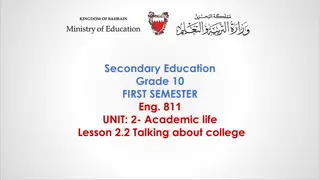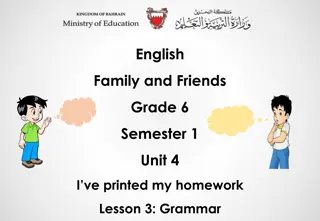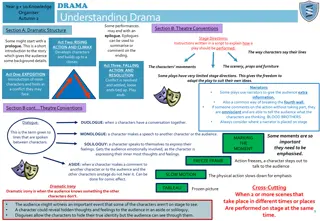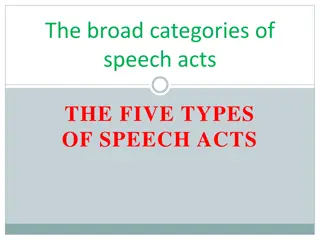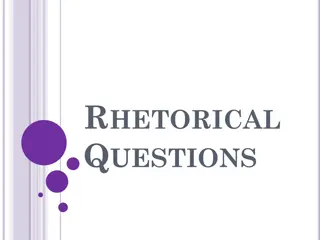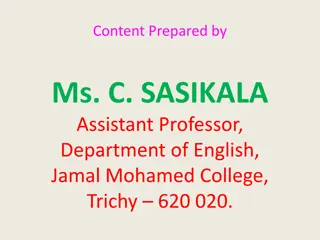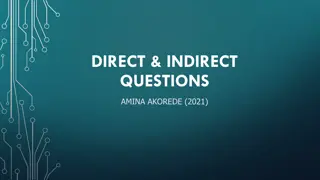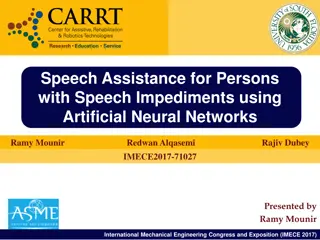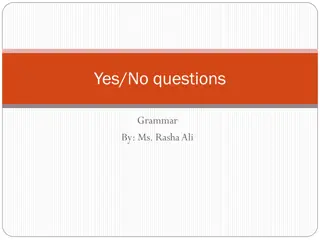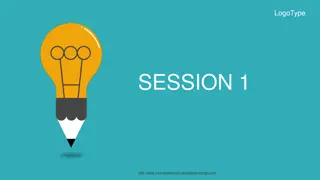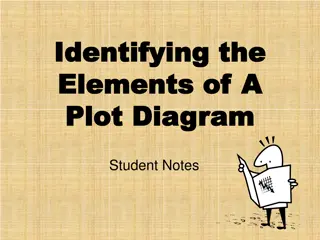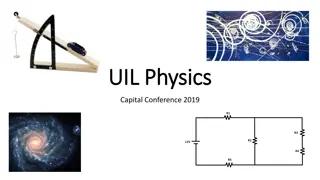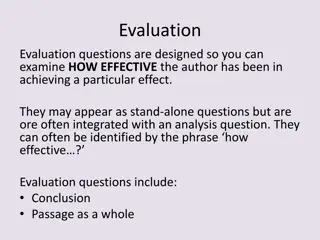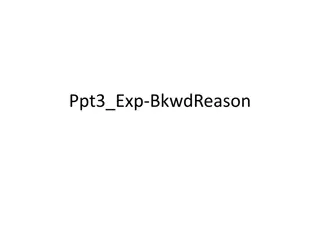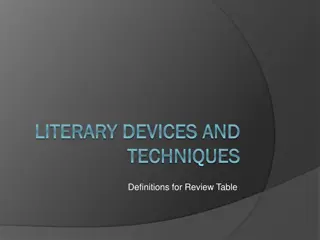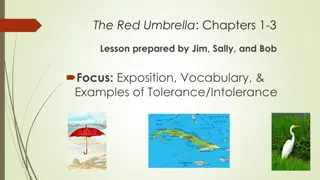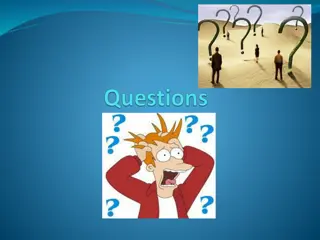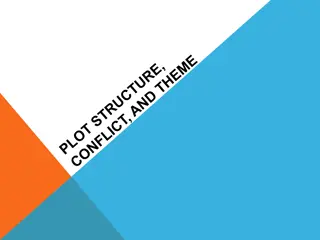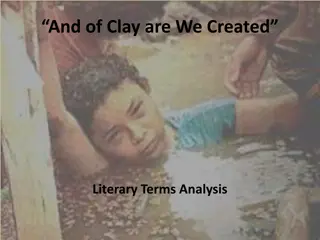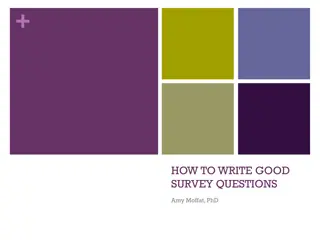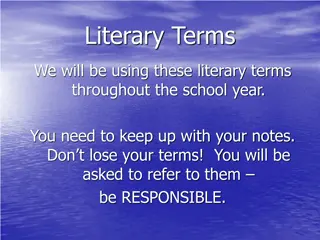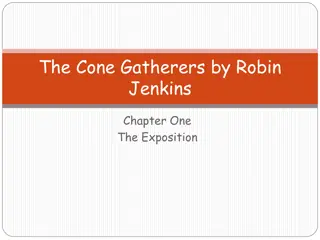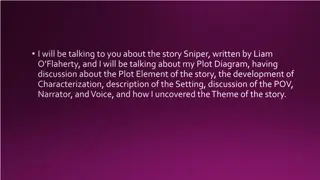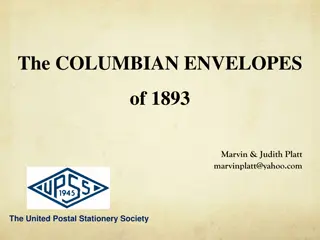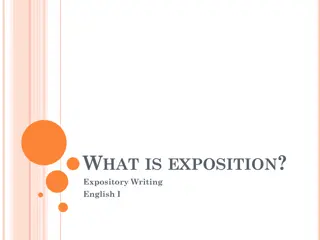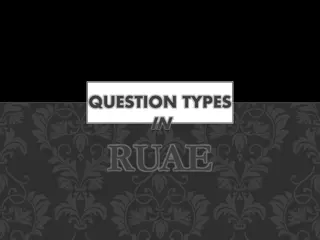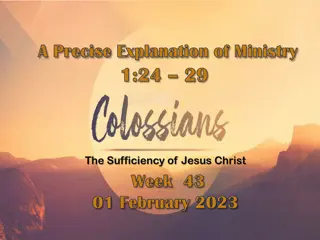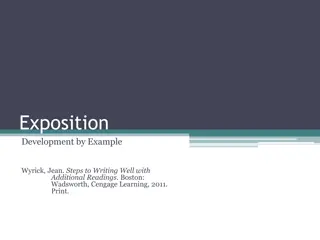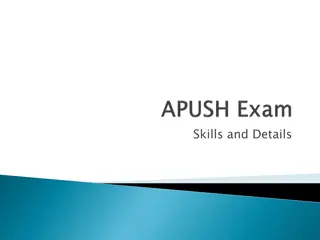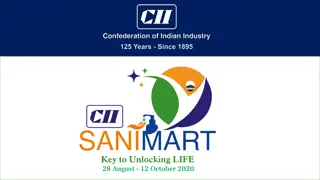Understanding Question Forms and Intonation in Academic English
Learn how to construct different types of questions and practice correct intonation when asking Yes/No questions and WH-questions in academic English related to college life. Enhance your skills in forming meaningful questions and recognizing the appropriate intonation patterns.
2 views • 10 slides
Learning Present Perfect in Yes/No Questions - Grade 6 English Grammar Lesson
Explore how to identify and use the present perfect tense in Yes/No questions through the engaging lesson on homework printing. Discover the structure and examples of asking and answering such questions correctly. Practice forming Yes/No questions using the present perfect tense with Cindy's chores.
14 views • 10 slides
Theater Conventions and Characterization in Drama
Theater conventions such as prologues, epilogues, dialogues, monologues, and dramatic structure like exposition, rising action, climax, falling action, and resolution are explored in drama. Additionally, the importance of character creation through techniques like backstories, flashbacks, and flashf
0 views • 4 slides
The Five Categories of Speech Acts Explained
Speech acts are divided into five categories: Verdicatives, Exercitives, Commisives, Behavitives, and Expositives. Verdicatives involve giving a verdict, Exercitives give a decision on a course of action, Commisives involve committing to an obligation, Behavitives are used in communication activitie
1 views • 10 slides
Understanding Plot Structure in Storytelling
Delve into the essential components of a plot - from the exposition introducing characters and setting, to the rising action building tension towards the climax, and the resolution in the falling action. Explore these elements through the journey of Tsotsi and his gang as they navigate through confl
1 views • 13 slides
Understanding Rhetorical Questions: Meaning, Usage, and Examples
Rhetorical questions are used to persuade and influence people by posing inquiries that do not require actual answers. By delving into the meaning, purpose, and identification of rhetorical questions, this comprehensive guide sheds light on how these questions play a crucial role in communication an
1 views • 17 slides
Mastering Tag Questions in English Grammar
Explore the intricacies of framing tag questions in English grammar through various examples and guidelines. Understand the structure of tag questions based on the statement being positive or negative, with different scenarios explained in a detailed manner. Enhance your knowledge on tag questions a
9 views • 9 slides
Understanding Direct and Indirect Questions in English
Direct questions are straightforward inquiries we pose to people we know well, while indirect questions are used for politeness and softening the inquiry. This article provides examples, explanations, and practice exercises for mastering the use of direct and indirect questions in English communicat
0 views • 12 slides
Assistive Speech System for Individuals with Speech Impediments Using Neural Networks
Individuals with speech impediments face challenges with speech-to-text software, and this paper introduces a system leveraging Artificial Neural Networks to assist. The technology showcases state-of-the-art performance in various applications, including speech recognition. The system utilizes featu
1 views • 19 slides
Understanding Yes/No Questions in English Grammar
Yes/No questions in English grammar are essential for communication. These questions have two basic types - Yes/No questions and Wh-questions. Yes/No questions, also known as closed questions, have only two possible responses - Yes or No. To form a Yes/No question, verbs like BE, DO, HAVE, or modal
0 views • 9 slides
Analysis of Saki's "The Open Window
Saki's "The Open Window" is a cleverly crafted short story revolving around a practical joke played by a young woman, Vera, on an unsuspecting visitor. The plot unfolds through the exposition, complications, climax, resolution, and conclusion stages, highlighting Vera's storytelling skills and the t
0 views • 8 slides
Enhancing Language Skills Through Wh-Questions Workshop
This workshop focuses on developing language skills through the use of wh-questions. Participants engage in pair work, individual activities, and a presentation to practice asking and answering personal questions. The session includes activities such as writing personal questions, answering question
1 views • 8 slides
Understanding Plot Diagrams: Elements and Structure
A plot diagram is a framework that outlines the sequence of events in a story. It consists of key elements like exposition, inciting incident, rising action, climax, falling action, and resolution. Each element plays a crucial role in developing the plot and engaging the reader throughout the narrat
0 views • 10 slides
UIL Physics Capital Conference 2019 Topics & Questions Overview
The UIL Physics Capital Conference 2019 featured various physics topics and questions ranging from teaching quantum physics to dogs to fields like astronomy, measurement, uniform motion, forces, energy, and more. The event covered a wide array of physics concepts, and the directed study text focused
1 views • 25 slides
Analysis of Evaluation and Conclusion Questions in Textual Analysis
Evaluation and Conclusion questions play a crucial role in assessing the effectiveness of an author in achieving specific effects and summarizing key points in a passage. These types of questions are commonly found in textual analysis tasks to evaluate the success of conveying ideas and themes. Eval
0 views • 9 slides
Backward Reasoning Approach in Exposition Questions
Utilize backward reasoning in exposition questions to underline subject matter, apply relevant physics knowledge, and deduce judgments. This strategy involves analyzing scenarios like heat transfer in making frothy milk to arrive at accurate conclusions. Through tackling questions step by step, you'
7 views • 9 slides
Exploring Literary Devices and Techniques in Storytelling
Delve into the world of storytelling with an examination of key literary devices and techniques such as plot, exposition, rising action, climax, falling action, and denouement. Understand the significance of similes, metaphors, personification, and other tools that bring narratives to life.
0 views • 82 slides
Exploring Exposition and Tolerance in "The Red Umbrella
In the lesson prepared by Jim, Sally, and Bob focusing on exposition, vocabulary, and examples of tolerance/intolerance in the first three chapters of "The Red Umbrella," key vocabulary words like "caravan," "oblivious," and "socialism" are explored. Discussion questions prompt critical thinking on
0 views • 6 slides
Understanding Different Types of Questions and Short Answers in English Grammar
This content covers various question forms in English grammar, including general questions, special questions, alternative questions, tag questions, direct and indirect questions, yes-no questions, and short answers. It explains the structure and usage of each type of question with helpful examples
1 views • 24 slides
The God of All Comfort - Exposition on 2 Corinthians 1:1-4
Delve into the profound message of comfort and encouragement found in 2 Corinthians 1:1-4, exploring the context of the epistle to the Corinthian church and the definition of comfort as provided in the Scriptures. Discover how God, the ultimate Comforter, offers solace, hope, and peace, and explore
0 views • 16 slides
Methods for Asking Critical Questions and Analysis Techniques
Explore various methods for asking critical questions such as open questions, closed questions, SWOT analysis, Paulo Freire's four open questions, the "But Why?" method, and the Five W's and an H technique. Each method encourages critical thinking and reflection to analyze situations effectively.
0 views • 7 slides
Understanding Plot Structure and Conflict in Storytelling
Plot structure is a key element in storytelling that outlines the sequence of events in a narrative. It consists of the exposition, rising action, climax, falling action, and resolution. Additionally, conflicts drive the plot by creating tension and obstacles for the characters to overcome, such as
0 views • 13 slides
Analysis of "And of Clay Are We Created" Literary Terms
In the analysis of "And of Clay Are We Created," the plot unfolds with events such as a volcano eruption in South America, a little girl trapped in the rubble, and the challenges faced in rescuing her. The story progresses through exposition, conflict, rising action, and climax, highlighting the the
0 views • 22 slides
Mastering the Art of Crafting Effective Survey Questions
Crafting good survey questions is essential for gathering accurate and meaningful data. Dr. Amy Moffat, PhD, provides valuable insights on key characteristics of survey questionnaires, best practices for asking survey questions, and how to avoid common pitfalls like double-barreled and biased questi
0 views • 16 slides
Creating a Beowulf-Inspired Superhero for Marvel Comics
Hired by Marvel Comics, you are tasked with developing a new superhero embodying the qualities of Beowulf. This project involves designing a brave, kind, protective, and honest character with superhuman abilities and a flaw, set in an Anglo-Saxon inspired society that values bravery, honesty, and co
0 views • 12 slides
Analyzing Failed Information Seeking Questions in Social Q&A Services
The research focuses on unsuccessful information seeking questions in social Q&A platforms, aiming to understand why some questions fail and proposing ways to improve the structure to enhance successful answers. Utilizing data collection methods via the Yahoo! Search API, the study identifies and an
0 views • 21 slides
Literary Terms Guide for Academic Year
In preparation for the upcoming school year, familiarize yourself with key literary terms such as Character, Diction, Imagery, Exposition, and more. Understand the roles of Antagonists and Protagonists, learn about Diction, Denotation, Connotation, and how they shape writing. Enhance your understand
0 views • 31 slides
Character Analysis and Exposition in "The Cone Gatherers" by Robin Jenkins
The exposition of "The Cone Gatherers" introduces the characters, their relationships, sources of conflict, setting, narrative voice, motifs, symbols, and foreshadowing. Calum is depicted as having a deep affinity with nature while exhibiting childlike innocence and sensitivity. Neil struggles with
0 views • 11 slides
Understanding GraphSLAM: Mapping Urban Structures with Soft Constraints
GraphSLAM is an algorithm that extracts soft constraints from data in the form of a sparse graph to create a globally consistent map and robot path. The key idea involves resolving these constraints for accurate mapping. The exposition details assumptions, measurements, and robot poses in the GraphS
0 views • 19 slides
Understanding Psalm 51:5 - Exposition and Reflection
Delve into Psalm 51:5-7 from the King James Version, where David reflects on sin and the desire for inner purity. The passage explores the concept of inherent sinfulness, the quest for wisdom, and the cleansing power of God's grace expressed through vivid imagery. Join in the contemplation of repent
0 views • 20 slides
Advancing the African Cashew Industry: ACA Partnership and Activities
Established in 2006, the African Cashew Alliance (ACA) is a collaboration between public and private partners aiming to promote a globally competitive African cashew industry. With a focus on all aspects of the cashew value chain, ACA's mission includes providing technical assistance, promoting mark
0 views • 15 slides
Analyzing "Sniper" by Liam O'Flaherty: Plot Elements, Characterization, Setting, and Theme
Exploring the plot diagram of "Sniper" by Liam O'Flaherty, this analysis delves into the exposition, inciting incident, rising action, climax, falling action, resolution, and dènouement of the story. It discusses the development of characterization, vivid description of the setting, the importance
0 views • 12 slides
The 1893 Columbian Envelopes: A Unique Commemoration
The 1893 Columbian Envelopes were issued by the U.S.P.O.D. to commemorate the World's Columbian Exposition held in Chicago. A total of 107,632,218 envelopes in various denominations, colors, die varieties, and sizes were produced, creating a total of 78 different envelope combinations. The envelopes
0 views • 26 slides
Understanding Expository Writing: Exposition and Thesis Statements
Expository writing involves explaining, describing, and discussing a topic through a structured essay format. It centers around a clear thesis statement supported by evidence. Learn about crafting effective thesis statements and differentiating between strong and weak examples.
0 views • 12 slides
Understanding Different Types of Questions in Reading Comprehension
Explore various question types in reading comprehension such as understanding questions, own words questions, analysis questions, evaluation questions, and how to effectively handle each type. Images illustrate examples and explanations for better comprehension.
0 views • 17 slides
Exposition on the Sufficiency of Jesus Christ in Colossians
In the book of Colossians, Paul emphasizes the preeminence and sufficiency of Jesus Christ. Through deep gratitude, prayer, and doctrinal teachings, Paul highlights Christ's divine nature, lordship over all, and role in creation and reconciliation. This exhortation encourages believers to remain ste
0 views • 39 slides
Mastering the Art of Exposition through Development by Example
Understanding the importance of development by example in writing: from vague vs. specific examples to the three types of examples - series, specific, and explanation. Enhance clarity and impact in your writing by learning effective illustration techniques.
0 views • 22 slides
AP US History Exam Details and Strategies
Get ready for the AP US History exam with a breakdown of the test structure, key historical skills, thematic areas, and scoring rubrics. Learn how to approach multiple-choice questions, short answer questions (SAQs), document-based questions (DBQs), and long essay questions effectively. Explore the
0 views • 14 slides
SANIMART Virtual Exposition: Innovations for Safe Workspaces in the COVID-19 Era
The SANIMART virtual exposition organized by the Confederation of Indian Industry aims to showcase innovations in the sanitation and personal hygiene space to combat the challenges posed by the COVID-19 pandemic. From sanitization industry products to technology applications, safety equipment, COVID
0 views • 14 slides
Mastering Tag Questions in English Grammar
Dive into the world of tag questions with this detailed lesson plan focused on helping learners understand and use tag questions effectively. Explore the concept, learn the mechanics, and practice creating tag questions for different scenarios. Enhance your English speaking skills and boost your con
0 views • 15 slides
